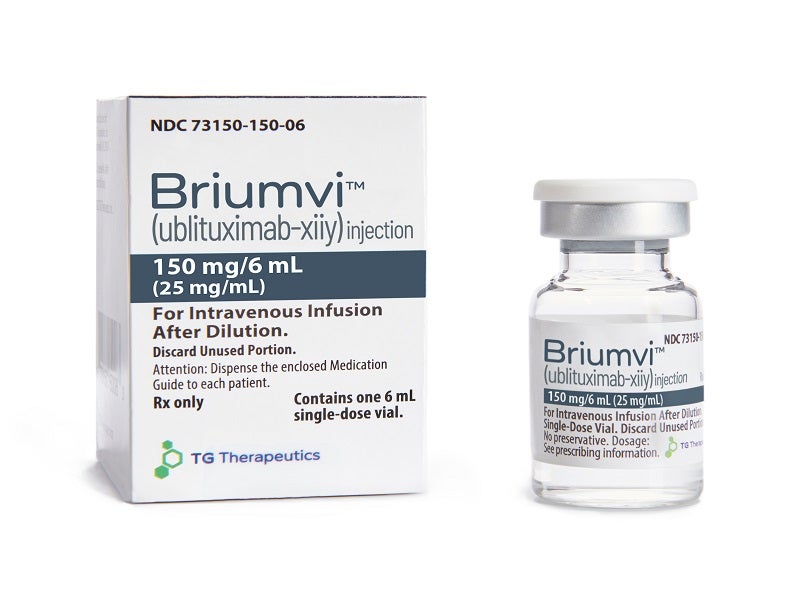Briumvi™ (ublituximab-xiiy) is indicated for the treatment of adults with relapsing forms of multiple sclerosis (RMS), including clinically isolated syndrome, relapsing-remitting disease and active secondary progressive disease.
Developed by US-based biopharmaceutical company TG Therapeutics, Briumvi is a glycoengineered monoclonal antibody that targets a unique epitope on CD20-expressing B-cells. These B-cells have enhanced antibody-dependent cellular cytotoxicity for treating B-cell malignancies and autoimmune disorders.
Briumvi is available as 150mg/6ml (25mg/ml) clear to opalescent, colourless to slightly yellow solution in a single-dose vial for injection. The drug can be administered to patients in a one-hour infusion twice a year following the starting dose.
Regulatory approvals for Briumvi
In December 2022, the US Food and Drug Administration (FDA) approved Briumvi for the treatment of RMS, to include clinically isolated syndrome, relapsing-remitting disease and active secondary progressive disease, in adults.
The European Commission approved Briumvi in June 2023. Following this approval, the centrally granted marketing authorisation is effective across all EU Member States, as well as Iceland, Norway and Liechtenstein.
RMS causes and symptoms
Multiple sclerosis impairs the central nervous system, including the brain and spinal cord. It causes the immune system to attack the myelin sheath that protects nerve fibres. It damages the sheath and affects the nerves, which compromises the transmission of nerve signals through the affected area.
Different types of MS affect patients in different ways. The relapsing form is a type of MS in which the disease relapses and remission occurs between the period of relapse. MS affects 2.8 million people worldwide, including one million patients in the US.
Signs and symptoms of the disease include troubled vision, sensitivity to heat, numb feet, weakness, fatigue, difficulty in thinking clearly, depression, needing to urinate urgently, trouble with balance, and lack of coordination.
Briumvi’s mechanism of action
Briumvi is a CD20-directed cytolytic antibody that targets the CD20-expressing B-cells and binds to them. This triggers a series of immunological reactions including antibody-dependent cellular cytolysis (ADCC) and complement-dependent cytolysis. The process ultimately leads to cell death.
In addition, ublituximab is engineered to lack specific sugar molecules that are generally expressed on the antibody, which enhances the drug’s potency, especially the ADCC activity.
Clinical trials on Briumvi
The FDA’s approval of Briumvi was based on the positive outcomes from a Phase III ULTIMATE trial programme that included two clinical trials, ULTIMATE I and ULTIMATE II.
ULTIMATE I and II were identically designed, 96-week, randomised, double-blind, double-dummy, parallel-group, active comparator-controlled clinical trials. In them, ublituximab was studied as a monotherapy administered in lower doses and with shorter infusion times in patients with RMS.
The ULTIMATE I and II trials enrolled 1,094 patients with RMS across ten countries. Both studies recruited patients who had experienced at least one relapse in the previous year, two relapses over the past two years, or had the presence of a gadolinium (Gd) enhancing T1 lesion during the past year.
The primary outcome of both studies was the annualised relapse rate (ARR) over the treatment period. Patients were randomised to receive either Briumvi as an intravenous infusion of 150mg administered in four hours, 450mg two weeks after the first infusion and administered in one hour, and 450mg every 24 weeks administered in one hour, with oral placebo administered daily, or teriflunomide, the active comparator, orally administered as a 14mg daily dose with intravenous placebo administered on the same schedule as Briumvi.
Both trials met the primary endpoint, demonstrating a statistically significant reduction in ARR for ublituximab compared with teriflunomide, the number of Gd-enhancing T1 lesions, and the number of new or enlarging T2 lesions.
The relative reduction in ARR was 59% in the ULTIMATE I study and 49% in ULTIMATE II. The most common side effects reported in patients in the clinical trials were upper respiratory tract infections and infusion reactions.
Additional clinical trials on Briumvi
TG Therapeutics is currently evaluating the safety and efficacy of the subcutaneous dosing regimen of Briumvi in a Phase III trial.
The trial is a randomised, open-label, parallel-group, multicentre non-inferiority study that will assess the pharmacokinetics, pharmacodynamics, safety, and radiological and clinical outcomes of subcutaneous Briumvi versus intravenous (IV) Briumvi in adults with RMS.
Participants will be randomised to one of three treatment arms: subcutaneous BRIUMVI administered every eight weeks, subcutaneous Briumvi administered every 12 weeks, or the currently approved IV Briumvi dosing regimen.
The primary endpoint of the clinical trial is to demonstrate non-inferior exposure for subcutaneous Briumvi compared with IV Briumvi, measured by area under the concentration–time curve at Week 24.
If successful, Briumvi would be the only anti‑CD20 treatment to provide both an IV, healthcare professional‑administered option and an at‑home, subcutaneous self‑injection option, offering patients and clinicians greater flexibility and choice.
TG Therapeutics is also evaluating the safety and efficacy of Briumvi for the treatment of RMS in a real-world setting in the Phase IV ENABLE trial. The 96-week observational study will enrol approximately 500 patients across the US.





